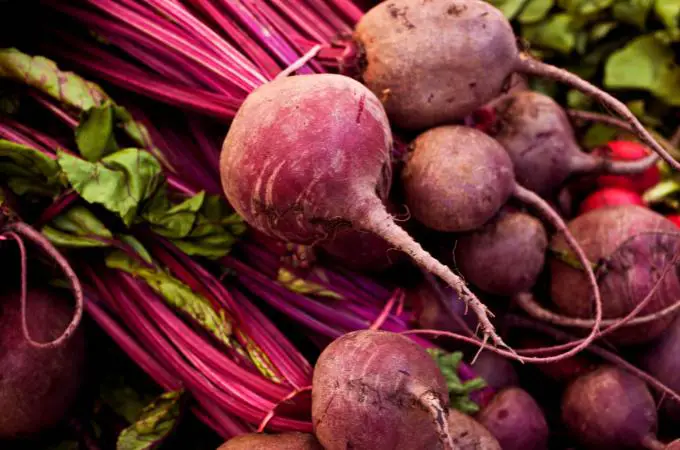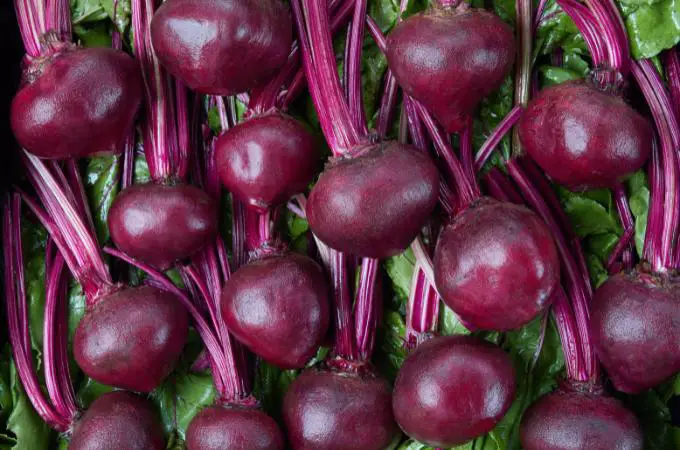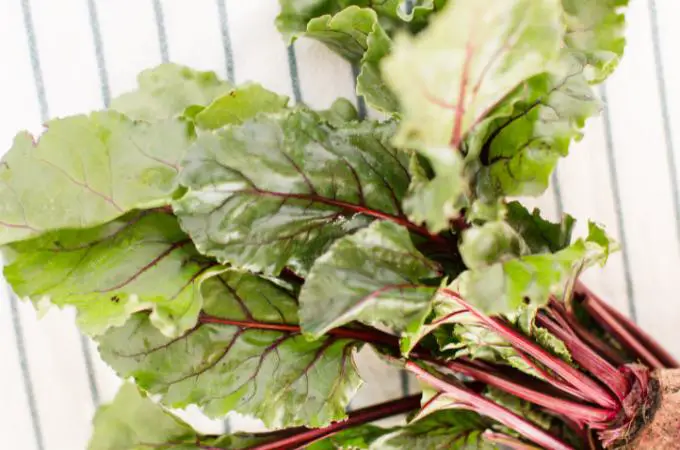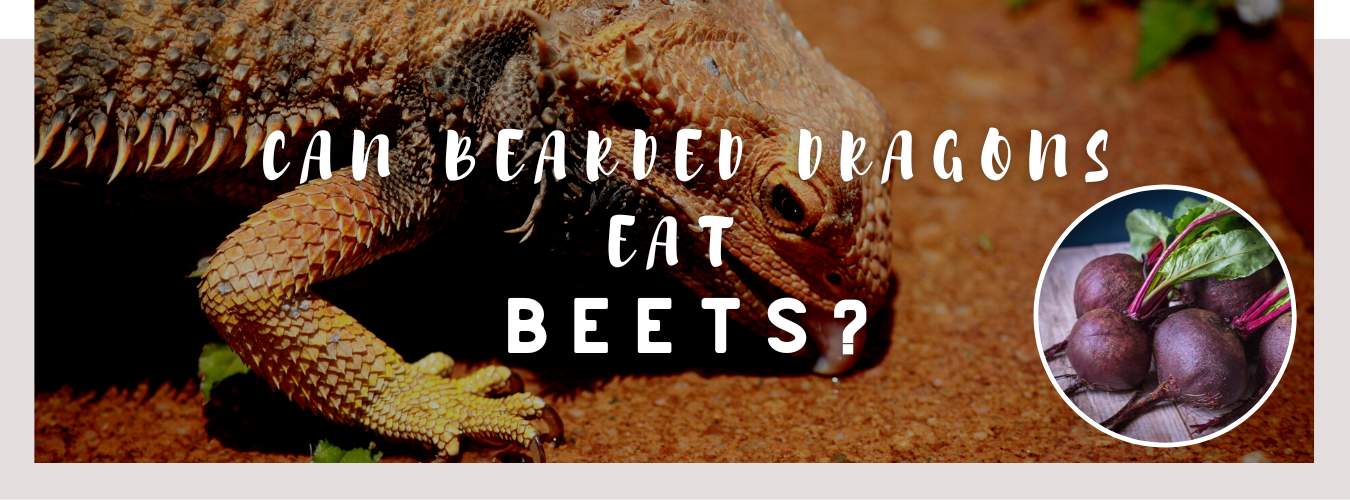
Vegetables are an essential part of a bearded dragon’s diet, but not all vegetables are equal and suitable for bearded dragons. Beetroot is the taproot portion of the beet plant.
So, can bearded dragons eat beets? The short answer is yes, bearded dragons can eat beets but only on rare occasions.
This article will explore the nutritional benefits, risks, and benefits of feeding beets to your bearded dragon.
Nutritional Information
A closer look at beetroot’s essential components will give a better understanding of how healthy or risky it is to feed beets to your bearded dragon.
| Nutrient Name | Amount |
| Calories | 43 |
| Sugar | 6.76 g |
| Fiber | 2.8 g |
| Protein | 1.61 g |
| Fat | 0.17 g |
| Potassium | 325 mg |
| Phosphorus | 40 mg |
| Calcium | 16 mg |
| Sodium | 78 mg |
| Water | 80 % |
| Vitamin A equiv. | 2 ug |
| Thiamine (B1) | 0.031 mg |
| Riboflavin (B2) | 0.027 mg |
| Niacin (B3) | 0.331 mg |
| Pantothenic acid (B5) | 0.145 mg |
| Vitamin B6 | 0.067 mg |
| Vitamin C | 3.6 mg |
You might also like: Can Bearded Dragons Eat Slugs?
Benefits of Feeding Beets to Bearded Dragons

Provide Hydration
Raw beetroot contains about 80% water. It is a great choice to keep your bearded dragon hydrated. This is a root vegetable that you can give them a little bit of in the summer to prevent them from becoming dehydrated.
Boost Immune System
Beetroot is a good source of vitamin C, which is essential to the immune system. If your bearded dragon isn’t getting enough of this essential vitamin, its body will be more vulnerable to all sorts of illnesses and diseases. By giving your beardie more vitamin C in its diet, you should be able to give your reptile’s immune system a big boost.
Vitamins
Vitamin A promotes eye health and supports the immune system. In addition, it aids in reproduction and assists in proper lung, heart, and kidney function.
Vitamin C or ascorbic acid is a significant nutrient found in many fruits and vegetables. Vitamin C aids proper growth and development, supports immune health, and helps keep bones and teeth strong.
Fiber
Aids in digestive function, prevents impaction and constipation and softens hard stools.
Potassium
Beetroot contains a moderate amount of potassium which helps regulate bearded dragons’ blood pressure. It helps them with the proper functioning of the kidneys.
Risks of Feeding Bearded Dragons Beets
One of the essential nutrients for a bearded dragon is calcium. This mineral is vital as it is needed to prevent them from developing metabolic bone disease.
High in Oxalates.
Beetroot is naturally high in oxalates. Oxalate is a compound that binds to calcium and other minerals. For a bearded dragon, it can cause health problems. When your bearded dragon’s body cannot absorb calcium, it will start to extract calcium from the bones. This will eventually lead to metabolic bone disease.
Too Much Phosphorus.
Beetroot has a disproportionate calcium to phosphorus ratio. With the calcium to phosphorus ratio being 1:2.1, beetroots aren’t optimal in large consumptions for bearded dragons. The phosphorus content is much higher than calcium. Like oxalate, the phosphorus will bind to calcium and other minerals which will prevent the minerals from being absorbed into the bloodstream.
Choking Hazard
Raw beetroot is very firm, which must be kept in mind when fed to your bearded dragon. Always make sure that you give your bearded dragon bite-size pieces that are not larger than the space between their eyes.
Larger chunks pose a potential choking hazard. Swallowing the large pieces can block the airway, which can be fatal.
You might also like: Can Bearded Dragons Eat Aloe?
Can Bearded Dragons Eat Beet Greens?

Yes, bearded dragons can eat beet greens occasionally. Fresh leafy greens like beet greens are a low-calorie option for bearded dragons. It is mainly composed of water and fiber, both of which are safe for your bearded dragon.
How Often Can Bearded Dragons Eat Beetroot?
Bearded dragons should be fed beetroot in moderation.
Beetroot doesn’t have enough nutrition to support the bearded dragon’s health. Also, it contains a high amount of oxalate, which in large amounts can cause harm.
You should only give them a small piece of beetroot once or twice per month.
How To Prepare Beetroot For Bearded Dragons
Feeding beetroot to your bearded dragon is straightforward and doesn’t require much preparation.
- With a fresh beetroot, wash them first to remove any pesticides and other chemicals that may be on there.
- Next, remove the peel from the root vegetable.
- Then, cut the beetroot into smaller pieces.
- With the small pieces of the vegetable, you have the option to feed them just the beetroot or mix it with other vegetables. If mixing them with other vegetables, make sure each piece of the vegetable is cut into small pieces as well.
- Place them into their feeding bowl and serve them to your beardie.
While beetroots are nutritious, make sure only to give them a small amount of the vegetable at each feeding.
Summary
We all want to provide our bearded pet dragon the best diet possible. And while beetroot is healthy for us, it can be too much of a good thing for our bearded dragons. Beetroot has high levels of oxalic acid, which can cause an upset stomach or even kidney failure in your lizard. Feed your bearded dragon beetroot in moderation and avoid overfeeding this tasty vegetable.
I am a huge animal lover and have four dogs, a Labrador, Jack Russell, Pug, and Teacup Yorkie. I also have a cat and a Cockatiel. I have had pets since I was a toddler, and there was not a day when there wasn’t an animal in my house.










